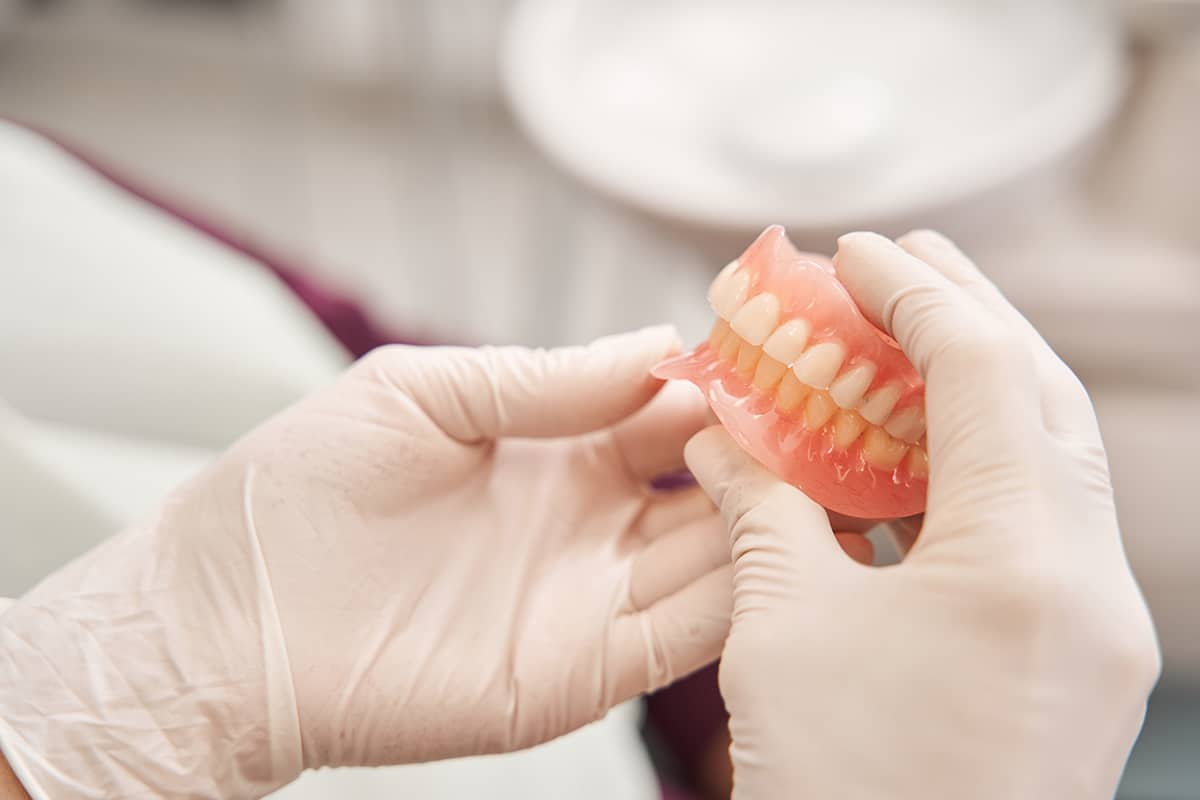Replacing missing teeth is an important step in maintaining oral health, eating comfortably, and feeling confident. There are many ways to restore your smile, from traditional dentures and partial dentures to modern solutions like dental implants and bridges. Let’s now take you through the pros and cons of dentures compared to other common dental restorations, helping you choose what’s right for your needs, budget, and lifestyle.
Whether you have a few missing teeth or need full or partial dentures, understanding your options can improve your dental care and overall well-being. Many people are unaware of the variety of denture options available or the long-term effects of leaving gaps untreated. Restoring your smile can prevent further dental problems and improve the quality of your daily life.
What are dental restorations?
Dental restorations are procedures used to replace missing teeth and restore the appearance and function of your mouth. Common options include removable false teeth (dentures), implant-retained dentures, dental bridges, and dental implants.
These solutions help protect your remaining natural teeth, support healthy teeth, and prevent dental problems like gum disease or tooth decay. Without prompt treatment, missing teeth can cause neighbouring teeth to shift, affect your bite, and even lead to bone loss in the jaw.
Why comparing options is important
Choosing the right dental restoration depends on many factors, including the number of missing teeth, the condition of your existing teeth, your budget, and your comfort preferences.
Comparing how much dentures cost, maintenance needs, and durability helps ensure you make a choice that suits your oral health goals. It is also helpful to understand how each option impacts your daily routine, from eating and speaking to cleaning and long-term oral care.
Overview of false teeth dentures
Types of dentures: full and partial
There are two main types of dentures: complete dentures and partial dentures.
Full denture sets replace all upper or lower teeth, while partial dentures replace a few missing teeth and are supported by the remaining natural teeth. Both can be made from a range of denture materials and some options, like immediate dentures, are fitted right after tooth removal.
Temporary or trial dentures may be used during the healing process, followed by final dentures once your mouth has fully adjusted.
Partial dentures are ideal when you still have existing teeth in place, and partial dentures replace the gaps while preventing remaining teeth from drifting. They often attach using metal clasps or a flexible base that blends with your gums.
 How dentures function in daily life
How dentures function in daily life
Dentures are removable appliances that sit over your gums and mimic natural teeth. Traditional dentures are usually held in place by suction or denture adhesive.
Some people use denture glue to improve grip, though dentures can still slip, especially while eating or speaking. Many wear dentures daily, removing them at night for denture cleaning with a denture brush and denture cleaning solution.
It is essential to remove your dentures before sleeping. Wearing dentures overnight can cause mouth sores, bacterial build-up, and other oral health issues. Soaking them in a sink filled with water or a dedicated denture solution can help maintain freshness and hygiene.
Understanding dental implants
Structure and procedure of implants
Dental implants are small titanium posts placed into the jawbone where teeth are missing. Once healed, they support artificial teeth or implant-supported dentures. Dental impressions are taken to ensure a proper fit, and a dental lab crafts your permanent dentures or crowns.
Implant-retained dentures are more secure than traditional dentures but require sufficient bone and a surgical procedure.
The healing process, called osseointegration, allows the implant to fuse with the bone, creating a strong and lasting foundation. Some patients may need a bone graft before implants can be placed, depending on jaw health and density.
Advantages of a fixed restoration
Dental implants offer excellent stability and can last for many years with good dental hygiene-keeping habits. They help preserve jawbone health and do not rely on existing teeth for support.
Unlike dentures, implants do not need to be removed overnight or maintained with a denture solution. They feel more like natural teeth and are less likely to cause mouth sores or discomfort.
Implants are a great long-term investment and provide a more permanent solution for tooth loss. They also allow you to chew normally without worrying about movement or dietary restrictions. Although the initial cost is higher, many people find the benefits outweigh the expense over time.
 Exploring dental bridges
Exploring dental bridges
Common types of dental bridges
Dental bridges are fixed restorations that use one or more neighbouring teeth to support a replacement tooth. There are several styles, including traditional bridges, cantilever bridges, and Maryland bridges. These work best when you have healthy teeth on either side of the gap.
The artificial tooth, known as a pontic, is typically made from porcelain or ceramic to match the surrounding teeth. Dental bridges offer a more aesthetic and secure alternative to removable options for patients who are not suitable for implants.
When bridges are a suitable choice
Bridges are an ideal option when you have a few missing teeth and want a fixed solution. They are less invasive than implants and more stable than removable false teeth. However, they may require shaping of your remaining teeth, and plaque and food deposits must be cleaned regularly to avoid gum disease or tooth decay.
Good dental hygiene, including brushing twice daily with fluoride toothpaste and using interdental brushes or floss, is essential to prevent damage beneath the bridge. A dental appointment every six months helps ensure your bridge stays in good condition.
Cost comparison: dentures vs. other options
Initial treatment costs
Dentures cost significantly less than dental implants or bridges, especially for full or partial sets. Partial dentures replace missing teeth without surgery and are more budget-friendly. The price may vary depending on the denture material, whether you need immediate or final dentures, and if adjustments are needed after fitting.
Implants are more expensive upfront, but they often require fewer replacements over a lifetime. Bridges sit between the two, offering a cost-effective solution for those missing a few teeth. Your clinical dental technician or dentist can guide you on the best option for your needs and budget.
Long-term value and ongoing expenses
While the upfront cost of dentures is lower, they may need to be replaced every 5 to 10 years. Dentures also require regular dental appointments, denture consultations, and possibly denture adhesives. Costs can add up with repairs, relining, or replacing worn-out dentures.
Dental implants and bridges can be more cost-effective in the long run, offering fewer replacements and less maintenance. However, they do require a higher level of initial investment and commitment to dental hygiene.
Financial providers may offer payment plans, but remember that your dentist is not a lender and cannot guarantee credit approval.
 Aesthetic appeal and natural appearance
Aesthetic appeal and natural appearance
How realistic do they look?
Modern dentures offer a more lifelike appearance than ever. Fitted complete dentures can closely resemble natural teeth, especially when created by a skilled clinical dental technician. Implant-supported options also look realistic and do not shift, providing a more confident smile.
Some patients choose custom shading and shaping for their dentures to better match their facial features and remaining teeth. This can greatly improve overall satisfaction with the final result.
Impact on confidence and speaking
False teeth that fit well can improve speech and boost self-esteem. However, it may be that traditional dentures click or shift, affecting pronunciation. With implant-retained dentures or bridges, people often feel more comfortable speaking and smiling without worry.
Speech difficulties usually resolve with practice and patience. Reading aloud and repeating tricky words can help you adjust to your new dentures more quickly.
Comfort and everyday functionality
Fit and feel: dentures vs. fixed options
Dentures are removable and may take time to adjust to, especially when eating or talking. You may need to chew slowly and avoid chewing gum, which can stick to dentures. Implant and bridge restorations feel more like natural teeth and tend to be more comfortable for daily use.
Properly fitted dentures should not cause pain or discomfort. If your dentures slip or cause irritation, see your dentist for an adjustment. Never attempt to modify dentures yourself.
Eating, speaking, and adjusting period
It can take a few weeks to get used to wearing dentures, especially if you have never used removable false teeth before. Eating soft foods and cutting food into small pieces can help during the transition. Unlike implants, which are fixed, dentures can slip or cause irritation if not fitted properly.
Avoid hard or sticky foods during the initial adjustment period. Always keep your dentures clean to reduce the risk of infections or unclean dentures irritating your gums.
Durability and lifespan
How long does each option last?
With good dental care, dentures can last 5 to 10 years, while dental implants may last decades. Bridges also offer long-lasting results if you brush with fluoride toothpaste and regularly remove plaque. The longevity of your restoration depends on care, material, and how often it is worn.
Regular cleaning and avoiding habits like chewing ice or biting fingernails will help extend the lifespan of your restoration, whether you choose dentures, implants, or bridges.
Factors that affect longevity
Denture material, how often you wear dentures, and your oral hygiene all affect how long restorations last. Unclean dentures can lead to gum issues, bleeding gums, and oral infections. Seeing your dentist regularly for check-ups helps extend the lifespan of all restoration types.
Maintenance and oral health
Daily care and ceaning needs
Dentures must be removed daily for cleaning. Use a denture brush and soak them in denture cleaning solution or a sink filled with water to avoid damage. Avoid using hot water or strong cleaners. Implant and bridge users must brush and floss carefully, especially around the gumline.
Store dentures in a moist environment when not in use. Dry dentures can warp and may no longer fit properly.
Risk of complications or oral issues
Neglecting denture hygiene or dental hygiene-keeping routines can lead to plaque and food deposits, gum disease, and mouth sores. Immediate dentures or improperly fitted false teeth may irritate your gums. Good dental hygiene and regular dental appointments help prevent these problems.
 Choosing the right option for you
Choosing the right option for you
Lifestyle, preferences, and health factors
Your choice between dentures, implants, and bridges will depend on your age, oral health, bone density, and personal comfort. For example, full denture sets may suit those missing all upper or lower teeth, while partial dentures are ideal if you still have healthy remaining teeth.
Factors like dexterity, diet, and willingness to undergo surgery should also be considered. Some people may prefer the convenience of dentures, while others value the permanence of implants.
Consulting your dentist for personalised advice
Before making a decision, schedule a denture consultation or dental appointment. A clinical dental technician or dentist can take dental impressions, assess your existing teeth, and discuss suitable denture options. Be sure to mention if you’ve experienced tooth loss, bleeding gums, or denture slip issues.
Personalised advice ensures that your restoration suits your oral health, lifestyle, and financial goals. Your dental professional will help guide you toward the most comfortable, functional, and cost-effective solution.
Whatever restoration is right for you, come to Fulham Road Dental!
At Fulham Road Dental, we understand that choosing the right way to replace missing teeth is a deeply personal decision.
Whether you need complete dentures, partial dentures, implant retained dentures, or another solution, our experienced team is here to guide you every step of the way. We offer bespoke treatment plans, using premium denture materials and advanced techniques to ensure your new smile is both comfortable and natural-looking.
Our clinical dental technicians and dentists take the time to understand your needs, create high-quality dentures in collaboration with trusted dental labs, and provide comprehensive aftercare. From your initial denture consultation to the fitting of your final dentures, we ensure everything is tailored to you.
Book your appointment today and let Fulham Road Dental restore your confidence, comfort, and oral health with expert, compassionate care.

 How dentures function in daily life
How dentures function in daily life Exploring dental bridges
Exploring dental bridges Aesthetic appeal and natural appearance
Aesthetic appeal and natural appearance Choosing the right option for you
Choosing the right option for you